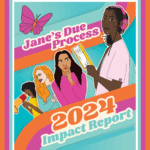By Mars Salazar, Let’s Write About Sex Education Fellow at Jane’s Due Process & Austin Bat Cave
Being a reserved and studious high school student, I did not prioritize going to house parties on weekends like my more restless peers. Rather, my nights and weekends were spent engrossed in 80’s era John Hughes movies, where I could study and experience teenage parties from a safe distance of 30 years and a laptop screen. However, common in these movies was the relentless sexualized nature of teens wanting to satisfy their raging hormones. From the perverted curiosity of the teenage boys in “Sixteen Candles” to the sexual tension and confusion of the characters of “Pretty in Pink,” there was an obvious emphasis on the heightened sexual energy that comes with adolescence.
Along with the sexual curiosity of the teenagers in these bildungsroman stories, there were the teachers who would do anything in their power to stop the seemingly reckless and troublesome nature of the urges that begin during the late stages of adolescence. Unfortunately, the interaction between administrative bodies and teenage students today does not vary significantly from the movies which made Molly Ringwald famous. Administrative bodies limiting sexual education curriculums to avoid controversy or backlash from parents for teaching sensitive or “explicit” material is detrimental to the knowledge and sexual health of students who are in their most sexually experimental and active years. According to a 2016 study done by the Texas Freedom Network, 58.3% of public schools in Texas teach abstinence-only based sexual education curriculums, while 16.6% teach abstinence-plus, and 25.1% of schools teach nothing at all. Abstinence-plus is the teaching abstinence as the primary basis of sexual education with additional information on contraceptives and STI’s if abstinence is not followed.
However, an entire sexual education curriculum based only on abstinence projects unrealistic standards for students who are curious and want to experiment with their sexual identity. Following my countless viewings of teenage movies where actors my age explored and discovered themselves and others intimately, I found the juxtaposition to my own sexual education shockingly limited in contrast to my fictional counterparts. According to the same 2016 study done by the Texas Freedom Network, 62.6% of Texas high school seniors have reportedly engaged in sexual activity before graduation, which is 5% higher than the national average. While a 2018 study by the National Center for Health Statistics found that birth rates among teens aged 15 to 19 decreased by 57% from 2000 to 2016, an abstinence-only based curriculum will prove to be ineffective by not including pregnancy prevention resources and instruction. This can be seen as 60% of Texas teens reported not using a condom during the last time they had intercourse and the state claiming the highest rate in the country for STI infections among teens between the ages of 15 to 19 according to the Texas Freedom Network (TFN). Compared to the glamorized nature of coming-of-age movies where disease is not an issue and pregnancy is rarely a concern, I found that the need for a realistic sexual education curriculum is crucial during a time when young people are unaware of the realities that lay outside the ideal realm of media.
School administrations restricting sexual education curriculums to the ideologies of parents limits the material students could be receiving which could better prepare and inform them on sexual health and protection. Unlike the hyper-conscious nature of Principal Vernon from The Breakfast Club, administrations should take into consideration the needs of students in a practical and realistic manner instead of assuming that teenagers will abide by abstinence-only instruction. While some teenage clichés remain constant fixtures in regards to adolescent promiscuity—and I continue to indulge myself in these fictional stories—it’s in our collective best interest to defy the constraints of what is considered appropriate and inappropriate to teach in school. Relying on teenagers to practice abstinence is as outlandish as the unrealistic and fictional stories where these clichés come from. By valuing the sexual health of students over the potential backlash from parents, students will have access to a more comprehensive and expansive curriculum that can better equip them to defy the harrowing statistics associated with teenage pregnancy and sexually transmitted diseases and infections, making their epic movie-ending romance complete with a classic 80’s pop ballad instead of a trip to the gynecologist.
If you have concerns about your sexual and reproductive health, our volunteer advocates are available 24/7 at 866-999-5263 and by text 8am-11pm CT to support you. Please don’t hesitate to contact us if you need help accessing birth control, STI testing & treatment, or abortion in Texas.




